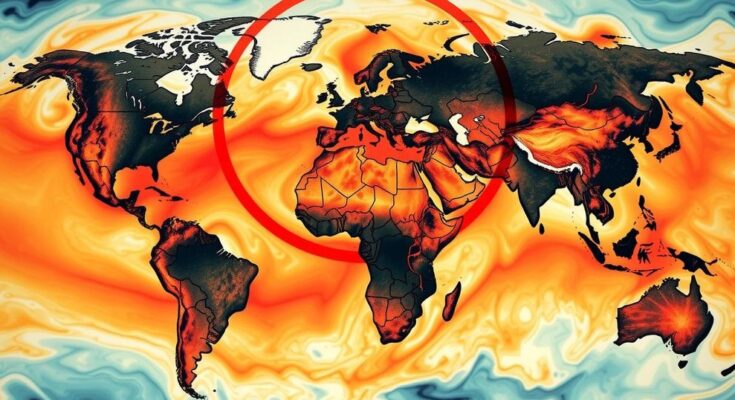Scientists confirm that 2024 was the first year with global temperatures exceeding 1.5°C above pre-industrial levels, marking a new milestone in climate change. Each month in 2024 was among the hottest on record, emphasizing the urgency of addressing rising emissions to avoid severe climate consequences. While this breach does not officially violate the Paris Agreement, scientists warn it reflects disturbing trends that require immediate global action.
In an alarming report, scientists have confirmed that 2024 marked the first full year in which global temperatures surpassed 1.5 degrees Celsius compared to pre-industrial levels. This landmark finding was released by the European Union’s Copernicus Climate Change Service (C3S), underscoring the unprecedented rise in global warming as a direct consequence of climate change driven by human activities. C3S director Carlo Buontempo highlighted that every month of 2024 was recorded as either the warmest or the second-warmest for that specific month since record-keeping commenced.
The average global temperature in 2024 reached 1.6 degrees Celsius above the pre-industrial baseline of 1850-1900. This surpassing of the 1.5-degree threshold, while significant, does not officially breach the target set forth by the Paris Agreement, which focuses on long-term temperature averages. Nonetheless, the trajectory of increasing greenhouse gas emissions suggests that the world may soon exceed that critical target unless decisive action is taken to reduce emissions. Buontempo remarked, “It’s not a done deal. We have the power to change the trajectory from now on.”
The consequences of climate change continue to manifest globally, impacting nations across all economic spectrums. Notably, California faced devastating wildfires in 2024, along with significant fires in Bolivia and Venezuela, and severe floods in regions including Nepal, Sudan, and Spain. The increased intensity and frequency of these weather events have been linked to the warmer atmosphere’s ability to retain more moisture, resulting in record amounts of water vapor in the atmosphere.
Despite the escalating costs associated with climate-related disasters, political commitment to addressing these issues appears to be diminishing in some areas. US President-elect Donald Trump has previously dismissed climate change as a hoax, contrary to the overwhelming scientific consensus acknowledging its human-induced nature and serious repercussions.
The 2024 data disclosed that carbon dioxide concentrations have surged to an unprecedented level of 422 parts per million, aggravating climate challenges. Zeke Hausfather, a research scientist, anticipates that 2025 will likely rank among the hottest years recorded, indicating the sustained influence of anthropogenic emissions alongside natural phenomena such as the El Nino weather pattern, which has recently shifted towards a cooling phase.
As experts like Chukwumerije Okereke emphasize, the breach of the 1.5-degree threshold should serve as a stark wake-up call for political leaders to enhance their commitment to climate action. Failure to address these warnings may lead to catastrophic consequences for the planet’s climate system.
The topic of global warming is of critical significance as it pertains to the measurable rise in the Earth’s average surface temperature due to human activities, primarily the release of greenhouse gases such as carbon dioxide. The Paris Agreement aims to limit global temperature increases to well below 2 degrees Celsius, with an aspiration to maintain increases to just 1.5 degrees Celsius. The Copernicus Climate Change Service plays a vital role in monitoring and reporting on climate variables, using comprehensive data to inform policy decisions and raise awareness about the impacts of climate change as observed through record high temperatures and extreme weather phenomena across the globe.
This assessment reaffirms the urgent need for global action to combat climate change, particularly in light of the new data indicating that 2024 was the warmest year on record. The continued increase in greenhouse gas emissions must be met with robust policy measures and international commitments to prevent further escalation of temperature rise. Ultimately, the world still possesses the capability to alter its climatic trajectory, but immediate and coordinated action is essential.
Original Source: sightmagazine.com.au




